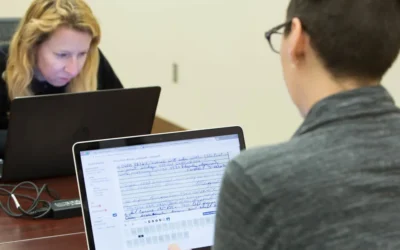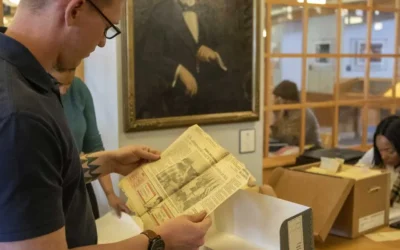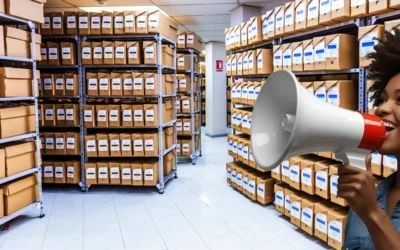Enhancing Collaboration; Methods for Archivists
Margot Note
Archivists play a pivotal role in fostering a culture of knowledge-sharing among colleagues.
In organizations, customer service is associated with the interactions between businesses and their clients. However, an often-overlooked dimension of customer service lies within the internal workings of an organization. Customer service principles within archival practices highlight how archivists can enhance collaboration through user-centric approaches and efficient processing methods.
User-Centric Approach
Archivists function as conduits of historical knowledge within an organization. By adopting a user-centric approach, they empower colleagues by providing access to archival records that hold solutions to challenges and insights into past successes. Responding to queries, facilitating access, and offering research guidance become integral components of their customer service repertoire. Archivists ensure their colleagues have access to information and possess the skills and support needed to extract valuable insights from historical data.
Archivists play a crucial role in preserving and protecting the integrity of historical documents and artifacts. Through cataloging, preservation efforts, and implementation of best practices, they safeguard the rich tapestry of an organization’s history. In doing so, archivists contribute to the longevity of institutional memory, ensuring that future generations can delve into the past and learn from the experiences and knowledge embedded in the archives. Their dedication to preserving an organization’s cultural and historical heritage benefits employees. It is a testament to its commitment to transparency, accountability, and understanding of an organization’s roots.
Streamlining Processes
Efficiency is key to providing exceptional customer service within archival settings. Archivists can employ the Stop-Alter-Continue-Start Assessment, a strategic evaluation tool for archival processes. The assessment streamlines tasks as archivists review and label them in four categories. “Stop” eliminates low-priority tasks, “Alter” adjusts practices for evolving needs, “Continue” maintains fundamental practices, and “Start” initiates actions for continuous improvement. The assessment is a dynamic process that empowers archivists to enhance their operations.
After identifying and eliminating inefficiencies, the assessment encourages archivists to alter existing processes. This involves refining workflows to adapt to changing circumstances and technological advancements. By embracing adaptability, archivists ensure that their practices remain effective and aligned with the latest standards. Additionally, the assessment prompts them to continue monitoring and evaluating their procedures. This commitment to improvement enables archivists to stay ahead of emerging challenges and deliver high-quality service in the ever-evolving landscape of archival management. The Start phase of the assessment encourages archivists to explore innovative approaches and technologies to enhance efficiency further, ensuring a future-oriented archival environment.
By eliminating non-essential, repetitive, or low-priority tasks, archivists have free time to assist colleagues with their archival needs. This approach allows them to focus on creating and improving processes aligned with evolving goals and best practices, optimizing workflows that contribute to service-oriented archival support.
Prioritizing User Needs
Adopting the More Product, Less Process (MPLP) methodology is a cornerstone in enhancing archival efficiency. MPLP challenges traditional archival tasks of arrangement, description, and preservation by prioritizing users’ needs. The method aims to reduce backlogs and provide faster collection access by applying minimal processing standards. Archivists implementing MPLP focus on essential steps to preserve and describe materials without getting stuck in unnecessary details. This shift in approach balances quality and quantity, ensuring the archival service is efficient and user centered.
Implementing the MPLP methodology streamlines archival processes and promotes adaptability to the evolving information management landscape. MPLP encourages archivists to embrace a pragmatic approach that values user accessibility and timely information delivery. By concentrating on core tasks, MPLP enables archivists to navigate the challenges posed by the increasing volume and diversity of materials in today’s digital age. This methodology aligns with the contemporary demand for efficient archival services while maintaining a commitment to preserving valuable resources. MPLP serves as a forward-looking strategy that addresses the complexities of modern information stewardship with a focus on effectiveness and relevance.
Customizing Strategies
Building upon the MPLP framework, archivists embrace extensible processing to tailor their strategies based on the unique characteristics of collections. Recognizing that different collections demand varying levels of processing and that users have diverse access expectations, extensible processing provides a flexible approach. Archivists can customize their strategies by considering collection size, complexity, condition, value, demand, and the archives’ resources, policies, and standards. This customization ensures the archival service remains adaptable and responsive to the organization’s diverse needs.
Archivists play a crucial role in internal customer service by fostering a knowledge-sharing culture among colleagues. By adopting a user-centric approach, streamlining processes through assessments, and embracing methodologies like MPLP and extensible processing, archivists contribute to the efficiency and effectiveness of archival services within organizations. The result is a collaborative environment where historical data becomes a powerful tool for addressing challenges, fostering innovation, and driving success.
Margot Note
To learn more, please join us for a free webinar, Championing Exceptional Archival Services Wednesday, May 8, 2024 at 11 a.m. Pacific, 2 p.m. Eastern. (Can’t make it? Register anyway and we will send you a link to the recording and slides afterwards). Register now
Never miss another post. Subscribe today!
Similar Posts
Collaborative Archival Relationships
Collaborative projects are instrumental in showcasing how archival collections can benefit various organizational departments.
Informational, Evidential, and Intrinsic Values within Archives
Archives provide authentic, reliable information and hold values that reflect their functions and uses; informational, evidential, and intrinsic.
A Sustainable Archives
Archivists prioritize sustainable practices and policies, rooting their work in ethics of care, often preferring digital processing and preservation
Archival Branding and PR Strategies
Archivists who adopt branding and PR strategies both safeguard historical treasures and contribute to their organizations’ evolution.




Leave a Comment
Comments are reviewed and must adhere to our comments policy.
0 Comments